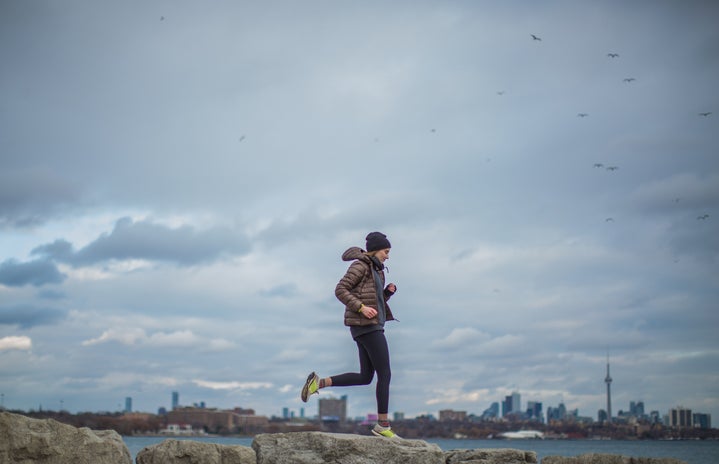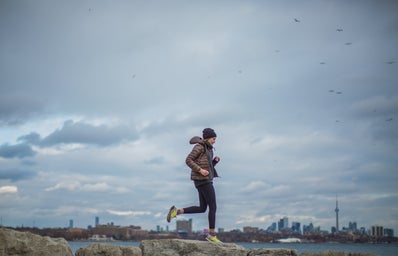Periods are something every woman has to deal with for most of her life. They’re inconvenient, uncomfortable and often times they’re painful. I’ve grown conscious of just how easy it is to reach for a bottle of Ibuprofen instead of trying to figure out how I can make my periods easier on myself. That’s not to say that taking medicine is bad or wrong, it’s just that I think we sometimes become dependent on it, and that can lead to other problems in life.
If your period is bothering you, talk to your doctor or gynecologist to make sure there isn’t anything serious to be worried about. Even if you are in perfect health, regular periods can be bothersome, so here are five ways to help manage your period, pill-free.
1. Eating well and drinking lots of water
One of the root causes of menstrual cramps is a poor diet. You’ve probably heard this all before, but the best thing you can do is eat a balanced diet and drink plenty of water. This is the most natural way to combat period cramps. Eat foods high in iron, like leafy green vegetables, for the best results. As tempting as it may be, try staying away from greasy foods and food that’s high in fat. You’ll feel better if you eat those veggies.
2. Exercise
The last thing you feel like doing when you’re on your period is exercise, but regular exercise may help keep cramps at bay. The endorphins from working out will work as a natural pain reliever and relaxer. If you’re having a particularly painful period and you don’t want to do the usual cardio or weight lifting, there are gentler options.
Fitness Magazine has a five-minute workout with five exercise moves that they designed to beat menstrual cramps that you can check out here. Yoga is my favorite exercise to do while on my period because it’s calming and it focuses on stretching out sore muscles. It can be a great relaxing workout or a power workout if you want to push yourself. Dance or Zumba are also great alternatives. Check out GMU’s free Group X classes (like Zumba, Barre, and Power Dance) for students this spring here. Group X, Indoor Cycling and Aqua Aerobics classes are free for students and faculty at GMU.
Related: 15 Things I Learned My First Semester At Mason
3. Hot water bottle or a heating pad
When you’re on your period, heat can be incredibly soothing for all of your aches and pains. If you have a heating pad, you can just plug that in and put it on your stomach or back- wherever the cramps are worst for you. If you don’t have a heating pad, a hot water bottle works really well too. Plus, it’s easy to travel with and often comes with a cute cover. If you don’t have a hot water bottle or a heating pad, fear not! You can make your own microwavable heating pad very easily.
All you need is an old pillowcase, uncooked rice and some string or a hair tie. Put the rice in the pillowcase and tie it closed, or you can always sew it closed too. I like adding essential oils to make it smell nice, but that’s optional. You just throw your makeshift heating pad in the microwave for 30 seconds or up to a minute and a half, depending on the temperature you like and presto! You have a heating pad. Be careful not to heat it for too long or you might burn yourself accidentally.
4. Red raspberry leaf tea**
I was skeptical when I first tried this tea. The use of teas to ease colds and headaches makes sense, but how could a tea help with cramps? I tried the Herbal Medicinals Red Raspberry Leaf tea and it worked wonders. The warmth of the tea is soothing for your aches and pains. Traditional Medicinals say’s on their website that the tea “Supports healthy menstruation, tones the uterus and may be used for menstrual cramps.”
I started by drinking the tea on the first day of my period, but you can always start a day or two before. It is recommended that you drink the tea regularly for it to work. Now, I try and drink it 1-3 times a day while on my period, depending on how bad the cramps are.
If you’re not used to drinking herbal teas, the tea may be rather leafy and bitter tasting, so it’s recommended that you add a sweetener or some honey until you’re used to the taste.
Herbal Medicinals also has a tea called Healthy Cycle that is a raspberry leaf tea with some other herbs in it that soften the taste and bring other benefits than just the raspberry leaf alone. There are lots of herbal remedies out there for menstrual cramps, but red raspberry leaf tea seems to be the most common and works the best.
Related: My Fitness Journey
5. Essential Oils
Essential oils don’t just smell nice, they have natural benefits for them as well! Aromatherapy has been around a long time and has been proven to work.
Cinnamon, an anti-inflammatory, has been helpful in reducing inflammation and menstrual cramping. Lavender oil will always be one of my favorites because it smells great and it works wonders. Lavender has also been shown to help reduce anxiety and stress and is great at helping you relax. It may be able to help relax menstrual cramping too.
Clary sage oil has been recommended to reduce cramps and ease the pain.
Ylang-ylang, an antidepressant herb is beneficial for the moodiness often felt while on your period, and it may help with cramping too.
Eucalyptus and chamomile oils are also often used for cramps (though if you’re allergic to ragweed you may want to be cautious when using chamomile because they’re part of the same family). Some people mix these oils together and use them in blends, others use them by themselves. You can put them into a diffuser in your home, mix them with lotion or oil (try coconut or sesame) and massaged into the lower abdomen or back, or you can add them to your bath and soak in them.
Next time, maybe try to stay away from the pain-killers, and try these natural and recommended remedies for those pesky period cramps!
**Raspberry leaf tea is considered an herbal supplement and should be discussed with your doctor before taking it


